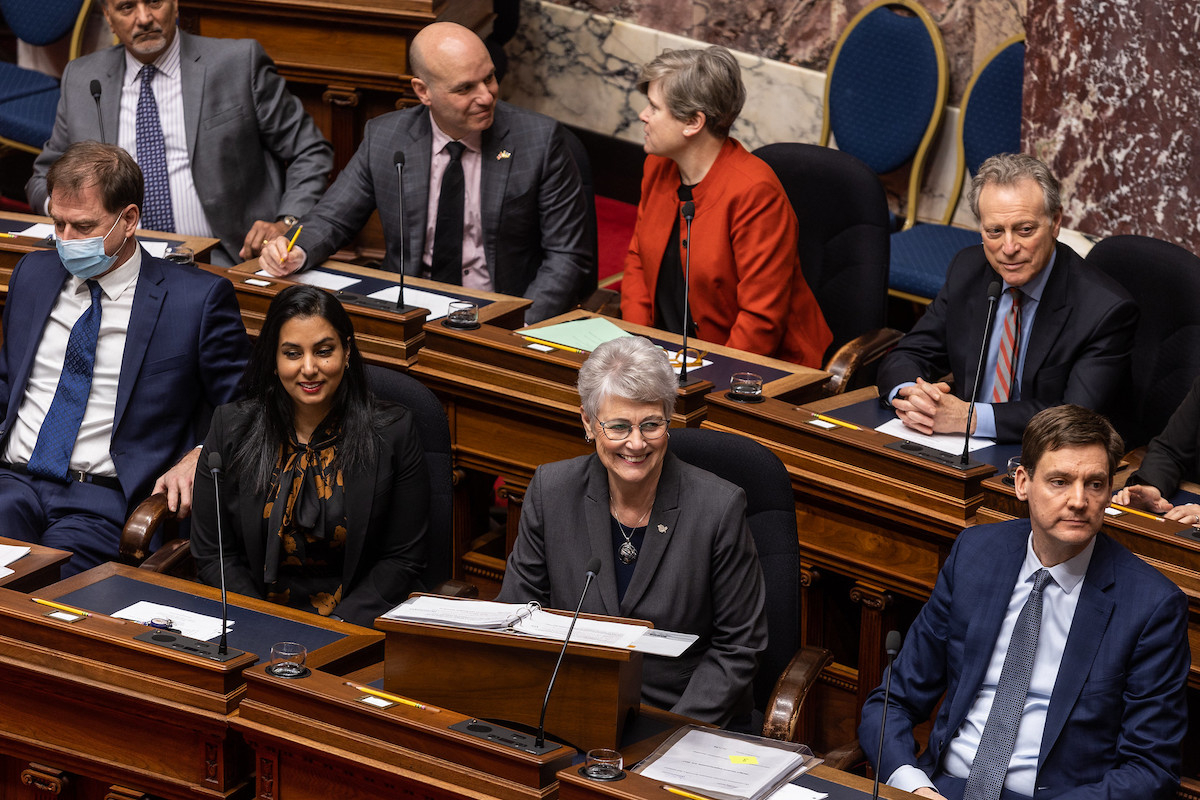Support strong Canadian climate journalism for 2025
B.C.’s budget viewed through a climate lens got mixed reviews from the province’s environmental and conservation sector following its release Tuesday.
The province got kudos for bolstering funding for parks and trails for active transportation initiatives to get people out of their cars and on bikes and walking paths. But the budget was panned by those hoping to see a wholesale commitment to the protection of old-growth or urgent, large-scale reductions of greenhouse gas emissions.
The NDP budget buffered some immediate impacts from the rising cost of living, but it failed to make transformative investments to lay solid foundations for a fair, affordable, sustainable future, the BC Green Party said.
“Premier [David] Eby seems to be sprinkling money around to a lot of existing programs and spending big on affordability cheques, but we're not going to solve the underlying issues that are driving big problems,” said Sonia Furstenau, BC Greens leader and the MLA for Cowichan Valley.
It was disappointing there were no big investments in community health centres or social services and supports, public transit, climate or the environment or preventative health care, Furstenau said.
This year’s budget offered “next to nothing” in the way of expanding BC Transit and no spending to build intra-regional transit to connect smaller, rural communities outside the Lower Mainland or beyond Greater Victoria on Vancouver Island, Furstenau said.
The province’s budget rhetoric offered very little on a vision for public transit, said transportation planning consultant Eric Doherty.
Capital investment for BC Transit in things like equipment, vehicles and infrastructure has doubled, going from $110 million to $232 million. And the fiscal plan suggests that spending will double again to $500 million by 2025-26, but it’s still unclear how and where that money will be spent in the short and long terms.
The province has also committed $100 million to grow active transportation — where people walk, ride or roll rather than drive in their community — over the next three years.
It’s a welcome small step, said Doherty, also a member of the Better Transit Alliance of Greater Victoria.
“But this is pocket change compared to the billions budgeted for highway expansion in urban areas,” he said.
The budget reflected some important conservation commitments that will help the province reach its conservation goal to protect 30 per cent of B.C. lands and waters by 2030, according to the Canadian Parks and Wilderness Society-British Columbia (CPAWS-BC).
The new budget allocates $100 million over three years for BC Parks, recreation sites and trails.
“A significant increase to the BC Parks and recreation budget will support beloved trails and campsites, and increase accessibility for people to connect with the lands and waters that make B.C. unique,” said Tori Ball, CPAWS-BC’s terrestrial conservation manager.
However, the budget doesn’t invest in the province’s commitments to defer the logging of 2.6 million hectares of old-growth, safeguard ancient ecosystems and meet the recommendations of the Old-Growth Strategic Review, according to the Wilderness Committee.
There’s no new funding beyond what’s already been announced for land use planning, said Terrance Coste, its national campaign director.
“If Premier David Eby and the BC NDP are serious about keeping their promises to safeguard at-risk old-growth forests and double the amount of protected areas in the province in the next seven years, they need to spend money to make it happen,” Coste said.
“We were looking for hundreds of millions of dollars in the years ahead to help enable conservation in old-growth forests and other important ecosystems and support solutions like Indigenous Protected and Conserved Areas.”
It’s also alarming the budget is projecting a rise in the production of liquefied natural gas (LNG) despite a 13 per cent average annual drop in gas royalties, Coste noted.
“Developing a fracked gas industry in B.C. has never made sense from a climate perspective, and it’s an increasingly bad economic deal for the province, as well.”
The budget includes $40 million to advance the transition to zero-emission vehicles through the province’s electric commercial vehicle pilot program to help the private and public sector fleets make the switch.
But the funding for the CleanBC pilot program was wholly inadequate given the scale of the challenge, said Sven Biggs, Canadian oil and gas program director for Stand.earth.
“We should be making generational investments to rapidly scale up renewable energy systems, build climate-resilient housing, expand public transportation, create good jobs in sustainable industries but instead, we’re continuing to spend billions on handouts for extremely profitable oil and gas companies.”
B.C.’s carbon tax will increase $15 per tonne annually until it hits $170 in 2030 as a means to encourage industry to cut emissions. But to ensure affordability for residents, rebates and climate action tax credits will be expanded, with a four-person family receiving a maximum of $900 a year, up from $500.
The budget did heavily invest in climate adaptation, with $1.1 billion over the next three years to build climate-resilient communities and to help areas still affected by climate disasters such as B.C.’s recent floods and fires.
Although the bulk of those funds, $750 million, had already been committed in 2022, an additional $300 million in capital funding is dedicated to provincial infrastructure damaged by climate emergencies.
B.C. has also created a new Ministry of Emergency Management and Climate Readiness to allow the province to better respond to emergencies and help communities plan and prepare for the climate crisis — with $85 million in the budget to boost emergency management and risk assessments and preparedness.
— With a file from Dirk Messner / The Canadian Press
Rochelle Baker / Local Journalism Initiative / Canada’s National Observer






Comments